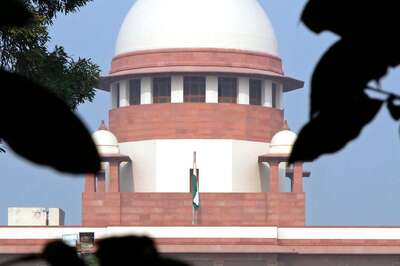
views
New Delhi: The Supreme Court on Thursday asked the government to spell out its norms and ratio for the disbursement of new currency notes to the banks and other financial institutions holding the public deposits as it observed that some people have plenty and other none.
"You have to have norms that should apply to all across the board," said the bench of Chief Justice TS Thakur, Justice AM Khanwilkar and Justice DY Chandrachud, pointing out that if district co-operative banks will not get new currency in return of the defunct currency they have deposited, how will they continue with their operations.
"If you receive Rs 1,000 crore of old currency notes (from a bank or a co-operative society operating under NABARD), how much of that will you return? You say not immediately. What is the time frame? First month, second month, you stagger the payments," said Chief Justice Thakur as government tried to skirt the question.
Having said this, the court reserved its order for interim direction for hearing on the challenge to the legality of demonetisation decision, whether matter is to be referred to a larger bench, questions to be addressed and the threshold limit on withdrawals by the account holders.
As court said that "there has to be a ration, you must have a policy", Attorney General Mukul Rohatgi said: "There are dynamics that work. A bank may deposit more money, but may not need amount equal to what it has deposited."
Defending the government's demonetisation decision, he said: "The country is facing a revolution to clean the slush money of 70 years. This is not a case of dispossession. Some initiatives have been taken."
Irrespective of posers from the bench or from the counsel appearing for the petitioners challenging demonetisation, the government stuck to one line that there were 7.5 lakh crore of currency notes in the market (five lakh crores of new denomination of Rs 500 and Rs 2,000 and 2.5 lakh crores of the denomination of Rs 10, Rs 20, Rs 50 and Rs 100.
Coupled with this, Attorney General repeatedly told the court that all the woes on account of rationing were for another 14 days as the last date for rationing of currency notes ends on December 31.
At this, senior counsel Kapil Sibal, appearing for one of the petitioners, said: "He says it is only 14 days. What will happen after December 31. People don't have money for meeting their basic needs and to pay the school fees of their children."
Repeating his earlier argument, Rohatgi said those affected by the demonetisation like the common man, farmers and others were not coming to the court and it were just the lawyers who were agitating before the court.
As he again repeated that there were Rs. 7.5 lakh crores in the circulation, the court asked: "How are people getting crores of new currency notes (obviously pointing to seizure of new currency notes worth crores), therte ard people who nothing."
"Some have plenty, others have nothing," the bench observed.
Urging the court to direct the government not to destroy the old currency notes, counsel Prashant Bhushan told the court that problem is that they don't have the new currency notes.
Another counsel disputed the figures of notes given by the government saying that they are "totally false" and contending that the government "can't do it (replace the notes) even in two years". He also pointed to the death of 96 people who had allegedly collapsed standing in long queues.




















Comments
0 comment